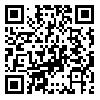BibTeX | RIS | EndNote | Medlars | ProCite | Reference Manager | RefWorks
Send citation to:
URL: http://jcp.khu.ac.ir/article-1-2987-en.html
The present study was conducted with the aim of determining the discrimination role of reinforcement sensitivity theory, emotion regulation processes strategies and cognitive flexibility in discrimination of people with internet addiction. The research design was a two-group diagnostic function. The study population included Internet user students at Imam Khomeini International University in Qazvin (18 to 35 years). Sample selection was done using convenience sampling method. The research sample consisted of 92 participants (46 = Internet addiction, 46 = normal). Data were collected using the Internet addiction inventory, cognitive flexibility inventory, emotion regulation process strategies inventory and Jackson's five-factor scale; and were analyzed using discriminant analysis. The findings showed that reappraisal and cognitive flexibility negatively, and then BAS, BIS and suppression positivey, in order, had the strongest relationship with the present function and discriminated the groups from each other. But the system of FFFS did not have a significant role in the discrimination of the two groups. In general, cognitive flexibility, emotion regulation processes strategies, and BAS and BIS sensitivity are important factors in discrimination people with Internet addiction from normal people.
Received: 2018/09/16 | Accepted: 2018/11/4 | Published: 2018/12/9
| Rights and permissions | |
 |
This work is licensed under a Creative Commons Attribution-NonCommercial 4.0 International License. |






